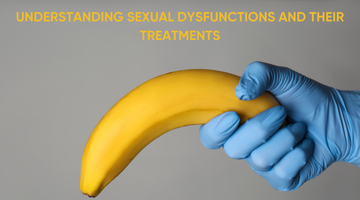
Sexual dysfunctions are common problems that affect a significant portion of the population. They can involve issues with sexual desire, arousal, or performance and can cause distress for individuals and their partners. Understanding the causes and available treatments for sexual dysfunctions is important for those affected and their partners.
One common sexual dysfunction is erectile dysfunction (ED), which affects an estimated 30 million men in the United States. ED is characterized by the inability to achieve or maintain an erection during sexual activity. Causes of ED can range from physical factors such as cardiovascular disease or hormonal imbalances to psychological factors such as stress or anxiety. Treatment options for ED include medication, penile injections, vacuum erection devices, and penile implants.
Another sexual dysfunction is hypoactive sexual desire disorder (HSDD), which is characterized by a lack of sexual desire. HSDD can affect both men and women and can have physical or psychological causes. Treatment options for HSDD can include counseling, hormone therapy, and medication.
Female sexual arousal disorder (FSAD) is another sexual dysfunction that affects women. FSAD is characterized by a difficulty becoming sexually aroused or experiencing sexual pleasure. Causes of FSAD can range from physical factors such as hormonal imbalances to psychological factors such as stress or relationship issues. Treatment options for FSAD can include counseling, medication, and physical therapy.
Premature ejaculation (PE) is another common sexual dysfunction that affects men. PE is characterized by ejaculating before or shortly after sexual penetration. Causes of PE can include psychological factors such as anxiety or depression, as well as physical factors such as hormonal imbalances. Treatment options for PE can include medication, counseling, and behavioral therapy.
Vaginismus is a sexual dysfunction that affects women and is characterized by involuntary muscle contractions in the vagina, causing pain or discomfort during sexual intercourse. Causes of vaginismus can include psychological factors such as anxiety or past traumatic experiences, as well as physical factors such as infections or vaginal dryness. Treatment options for vaginismus can include counseling, physical therapy, and the use of vaginal dilators.
Sexual dysfunctions can have a significant impact on an individual's quality of life and their relationship with their partner. It is important for those affected to seek treatment to improve their sexual health and well-being. In addition to medical treatments, therapy can also be helpful in addressing psychological factors that may contribute to sexual dysfunctions.
In conclusion, sexual dysfunctions are common problems that can cause distress for individuals and their partners. Understanding the causes and available treatments for sexual dysfunctions is important for those affected and their partners. Treatment options can range from medication and therapy to physical therapy and hormone therapy. It is important for those affected to seek treatment to improve their sexual health and well-being.




